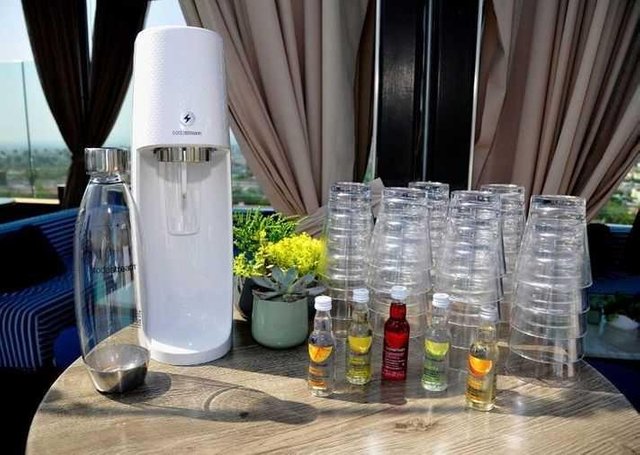Pepsi is betting that the future of soda is at home and more in the realm of sparkling water than in aluminum cans laden with 41 grams of sugar: The beverage giant announced Monday morning that it is spending $3.2 billion, or $144 per share, to acquire at-home seltzer maker SodaStream.

Pepsi is spending $3.2 billion, or $144 per share, to acquire at-home seltzer maker SodaStream. (Photo by John Sciulli/Getty Images for SodaStream USA)
deal, which Pepsi plans to fund with its cash on hand, values SodaStream at a 32% premium to its 30-day volume-weighted average price and a 10% premium to its closing price on Friday.
“PepsiCo and SodaStream are an inspired match,” outgoing Pepsi CEO Indra Nooyi said in a statement Monday morning. “Daniel and his leadership team have built an extraordinary company that is offering consumers the ability to make great-tasting beverages while reducing the amount of waste generated.”
Added Daniel Birnbaum, SodaStream’s CEO: “I am excited our team will have access to PepsiCo’s vast capabilities and resources to take us to the next level. This is great news for our consumers, employees and retail partners worldwide.”
The marriage with Pepsi is a poetic turn for the at-home sparkling water maker; in 2012, Birnbaum told Forbes that the soft-drink and bottled-water industry was “flawed,” “broken,” “wrong,” “stupid” and “evil.” And though Birnbaum took an almost “if you can’t beat them, join them” approach in late 2014 when he struck a deal with Pepsi to test at-home versions of Pepsi and Sierra Mist (a move that followed months of rumors that SodaStream was selling itself to the beverage giant), the company has in recent years been more focused on positioning itself as a “wellness solution” and a “leading manufacturer of sparkling water makers.” Instead of soda, it’s been marketing at-home seltzer—and the pivot has paid off in dividends.
SodaStream’s stock price, which was suffering at a mere $13 a share in early 2016, has gained more than 84% in value in 2018 alone. In its most recent quarterly earnings report, SodaStream reported quarterly profit that was double that of the Wall Street estimate; the company also tripled its earnings forecast for the year.
The focus on sparkling water is also a key reason Pepsi is so willing to bet billions on the company. As consumer tastes have shifted away from soda, Pepsi has been trying to establish itself in the seltzer arena with its line of Bubly sparkling waters (it launched the brand this February, one year after launching premium bottled water LIFEWTR). The SodaStream acquisition will increase its foothold in this part of the market.
“SodaStream is highly complementary and incremental to our business, adding to our growing water portfolio, while catalyzing our ability to offer personalized in-home beverage solutions around the world,” Ramon Laguarta, Pepsi’s incoming CEO, said in a statement Monday.
The transaction, which CNBC reported came together in a matter of weeks, is expected to close by January 2019.
Wall Street, meanwhile, is happy with what it sees, sending SodaStream shares for a 10% gain in Monday’s pre-market trading session. Pepsi, meanwhile, is up just half a percent in pre-market trading.
Hi! I am a robot. I just upvoted you! I found similar content that readers might be interested in:
https://www.forbes.com/sites/maggiemcgrath/2018/08/20/pepsico-betting-3-2-billion-that-the-future-of-soda-is-sparkling-water-made-at-home-with-sodastream/
Downvoting a post can decrease pending rewards and make it less visible. Common reasons:
Submit